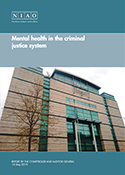News review – June 2019
The Scottish Parliament passed a safe staffing law covering health and social care. The Scottish government said the law would lead to better outcomes for patients and clients and ‘embed openness in decisions about staffing across clinical staff groups’. Health secretary Jeane Freeman said the legislation was about putting ‘the right skills in the right place at the right time’. New workforce planning tools will be used to calculate the recommended number of nurses and midwives for the workload.
The NHS in Scotland will also introduce measures to improve workplace culture after a report on allegations of bullying and harassment at NHS Highland. The measures include installing a whistleblowing champion in each health board by the end of 2019. Ms Freeman will write to each board asking them to reflect on the report findings and will hold a summit in the summer to consider how to improve workplace practice. She also launched a consultation on legislation to make the Scottish public service ombudsman the independent whistleblowing officer for the NHS.

Although Northern Ireland has been without a power-sharing executive since January 2017, talks between the political parties on restoring the executive have resumed. In the absence of a health minister, senior civil servants are constrained in what they can do, but they continue to act where they can under a broad consensus on service transformation. Department of Health permanent secretary Richard Pengelly said the transformation programme, Delivering together, has made significant progress, but further reshaping of services is the long-term answer to long waiting lists.
Work has started on a new 10-year cancer strategy for Northern Ireland. Chief nursing officer Charlotte McArdle, who is leading the work, said it was imperative that a strategy for 2020 to 2030 be developed. Between 2009 and 2013 an average of 4,347 male and 4,175 female cases of cancer were diagnosed each year but this is expected to rise by 43% for men and 40% for women by 2026.
 The justice system in Northern Ireland is increasingly being used as the service of last resort for people with mental health problems, according to the Northern Ireland Audit Office. Its report, Mental health in the criminal justice system, said funding of mental healthcare had not kept pace with demand and individuals can struggle to access the care they need. It added that the Police Service of Northern Ireland receives more than 20,000 reports a year of incidents involving people experiencing mental health crises but where a crime has not necessarily been committed.
The justice system in Northern Ireland is increasingly being used as the service of last resort for people with mental health problems, according to the Northern Ireland Audit Office. Its report, Mental health in the criminal justice system, said funding of mental healthcare had not kept pace with demand and individuals can struggle to access the care they need. It added that the Police Service of Northern Ireland receives more than 20,000 reports a year of incidents involving people experiencing mental health crises but where a crime has not necessarily been committed.
Welsh health and social services minister Vaughan Gething announced funding of almost £15m for the transformation of health and social care in the Swansea Bay area. He said the money would come from the government’s £100m transformation fund, which was created to support implementation of the local NHS long-term plan, A healthier Wales. The funding will be split between two projects – £8.8m for a pilot of a whole-system model and £5.9m to bring services together so that patients experience seamless care.
 A new communications network for ambulance, police and fire services in England, Scotland and Wales is set to cost £3bn more than planned, the National Audit Office said. A critical report, Progress delivering the emergency services network, said the Home Office – the government department overseeing the project – now forecasts the new network will cost £9.3bn following delays and cost rises during implementation. The audit body warned the new forecast costs are uncertain and the network is unlikely to be ready for 2022. It said £1.4bn of the extra costs are due to the need to extend the use of the Airwave system. It is now due to be switched off in December 2022, three years later than planned.
A new communications network for ambulance, police and fire services in England, Scotland and Wales is set to cost £3bn more than planned, the National Audit Office said. A critical report, Progress delivering the emergency services network, said the Home Office – the government department overseeing the project – now forecasts the new network will cost £9.3bn following delays and cost rises during implementation. The audit body warned the new forecast costs are uncertain and the network is unlikely to be ready for 2022. It said £1.4bn of the extra costs are due to the need to extend the use of the Airwave system. It is now due to be switched off in December 2022, three years later than planned.
MPs have insisted that the Department of Health and Social Care, NHS England and Public Health England must do more to ensure patients take part in health screening. A report from the Commons Public Accounts Committee – which looked at four of the 11 national screening programmes – bowel, breast and cervical cancers and abdominal aortic aneurism – said the government is ‘losing grip’ on screening. There was wide variation across England in the proportion of eligible patients who are being screened, it added.
Monthly operational performance figures continued to show a service under pressure. The proportion of A&E attendances transferred, admitted or discharged within four hours fell in April, with NHS England figures showing 85.1% of patients were seen within the target four hours. In March, it was 86.6%. However, the April figure was a 2.5 percentage point increase on April 2018 – despite a 6.6% increase in attendances over the 12 months. There was a slight drop in waiting list performance. In February this year 87% had been waiting fewer than 18 weeks, but this fell to 86.7% in March, failing to meet the 92% target in both cases. The number of completed referral to treatment pathways increased by two percentage points compared with March 2018.
The NHS continues to try to bear down on the pressures on hospitals and in May NHS England launched the roll-out of a programme to avoid unnecessary hospital admissions. Under a scheme that has been trialled in integrated care systems, clinicians, including 200 pharmacists and pharmacy technicians, will work in care homes to help avoid unnecessary admissions to hospital. NHS England said they would also improve residents’ quality of life and reduce over-medication. Elderly care home residents account for around two million days in hospital each year and 250,000 emergency admissions. It is believed 35% to 40% of those admissions are avoidable through actions such as preventing over-medication, NHS England said. Studies have linked 10% of admissions of elderly people to medicines they have taken, it added.
The multiple sclerosis (MS) drug ocrelizumab will be available on the NHS following a deal agreed between NHS England and pharmaceutical company Roche. The national commissioning body said the drug is given to patients with primary progressive MS every six months and costs around £190,000 per patient per year at the normal price. However, it added the commercial in confidence deal ensured that cost effectiveness estimates for the drug would fall in the range NICE considers an acceptable use of NHS resources.
The month in quotes
‘Being open about decisions on staffing allows health boards to allocate staff efficiently and effectively. I want staff to feel informed about decisions relating to staffing requirements and safe to raise any concerns about staffing levels.’
Scotland’s new safe staffing law gives staff a chance to speak up, says Scottish health secretary Jeane Freeman
‘[This] report charts significant progress in the two and a half years since the publication of Delivering together, the 10-year roadmap for transforming the way services are delivered. Without this push for change, the system would now be slipping over the edge into irreversible collapse.’
NI Department of Health permanent secretary Richard Pengelly on the local transformation of health and care services
‘Older people deserve the best possible support and with many care home residents living with complex conditions, bringing in extra expert health advice will mean the NHS can reduce avoidable drug use, improve care and free up vital funding for better treatment.’
Placing specialist staff in care homes makes sense for everyone, says Alistair Burns, NHS England national clinical director for dementia and older people’s mental health
 ‘The success of the emergency services network is critical to the day-to-day operations of our emergency services that keep us all safe. The Home Office needs a comprehensive plan with a realistic timetable that properly considers risks and uncertainties. It has already been through one costly reset and is in danger of needing another unless it gets its house in order.’
‘The success of the emergency services network is critical to the day-to-day operations of our emergency services that keep us all safe. The Home Office needs a comprehensive plan with a realistic timetable that properly considers risks and uncertainties. It has already been through one costly reset and is in danger of needing another unless it gets its house in order.’
National Audit Office head Amyas Morse issues a call to action on the new emergency communication network
From the HFMA
 HFMA Commissioning Finance Faculty chair David Chandler (pictured) argues that finance staff need a greater understanding of NHS continuing healthcare (CHC). In a blog for the HFMA website, he says that for clinical commissioning group finance staff, CHC can represent an ever-growing overspend or pressure in the accounts. However, they can play a key role in ensuring continuing healthcare is delivered to the most vulnerable and that rules are applied consistently.
HFMA Commissioning Finance Faculty chair David Chandler (pictured) argues that finance staff need a greater understanding of NHS continuing healthcare (CHC). In a blog for the HFMA website, he says that for clinical commissioning group finance staff, CHC can represent an ever-growing overspend or pressure in the accounts. However, they can play a key role in ensuring continuing healthcare is delivered to the most vulnerable and that rules are applied consistently.
The HFMA aims to support finance staff and help them get to grips with CHC – a ‘how it works’ guide is now available, explaining the basics, eligibility criteria and organisational responsibilities; and the faculty also held a technical forum on the subject during May.
Another new HFMA briefing focuses on the implications of the NHS long-term plan for the finance function. In a blog outlining the key themes, association policy and research manager Sarah Day says the plan means new ways of working, the development of new skills and the need to build relationships across organisations that may traditionally have been viewed as competitors. Finance staff will be closely involved in delivering quality improvements and more efficient use of resources – using their skills to support the wider system and identify improvement opportunities, she adds.
For more blogs, see www.hfma.org.uk/news/blogs
Related content
We are excited to bring you a fun packed Eastern Branch Conference in 2025 over three days.
This event is for those that will benefit from an overview of costing in the NHS or those new to costing and will cover why we cost and the processes.